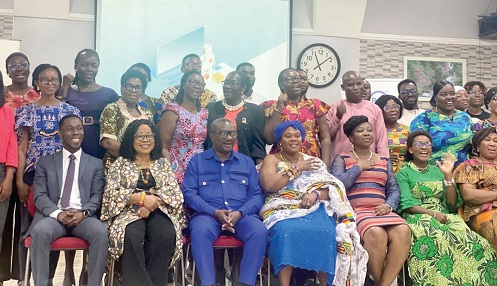Stakeholders promoting gender policies for safe spaces on university campuses have stressed the need to strengthen reporting mechanisms for cases of sexual harassment and gender-based violence.
That, they said, was not only crucial for immediate safety but also for fostering a healthier, more exclusive campus culture for students’ development.
They shared their views at a multi-stakeholder workshop on strengthening survivor-centred responses to gender-based violence and sexual harassment, and on establishing safe reporting spaces on university campuses.
The stakeholders are a Senior Programme Officer at the Ministry of Gender, Children and Social Protection, Ernestina Oduro; a Gender Advocate and Consultant, Mecy Adjabeng, and the Executive Director of Perfector of Sentiments (POS) Foundation, Jonathan Osei Owusu.
Workshop
The workshop, organised by the POS Foundation with funding from Amplify Change — a non-governmental organisation that supports civil society groups advocating improved sexual and reproductive health and rights (SRHR) — brought together representatives from five public universities, government agencies, and other stakeholders.
The universities are Kwame Nkrumah University of Science and Technology (KNUST), University of Cape Coast (UCC), University of Ghana, Legon, University of Education, Winneba (UEW) and the University of Development Studies (UDS).
Participants explored practical solutions and shared commitments across key focus areas, including creating and maintaining safe spaces on campus, preventing sexual harassment and gender-based violence, and strengthening and effectively implementing gender policies within academic settings.
Gaps
Ms Adjabeng explained that even though the country had made progress in the area of advocacy, gaps remained, including limited policy awareness, inconsistent enforcement, insufficient resources for specialised personnel, and the absence of standardised monitoring mechanisms.
In addition to this, she said students did not have confidence in the reporting mechanisms.
“This is because we do not address these issues as a human rights issue but as a reputation issue, so oftentimes, people are made to keep quiet,” she said.
She, therefore, called for urgent attention to these significant gaps in policy and awareness.
She said the ministry recognised the devastating impact that sexual harassment and gender-based violence (GBV) had on individuals, families, and communities, particularly within the tertiary institutions, which were meant to be safe spaces for learning and personal development.
These acts, she said, not only violate fundamental human rights but also threaten the dignity, safety and aspirations of young people, especially women and girls.
In line with the ministry’s mandate to promote gender equality, protect children’s rights, and support the vulnerable, she said the ministry remained committed to strengthening policies and frameworks that address sexual harassment and gender-based violence across all spaces.
She added that the ministry had also supported the establishment of survivor-centred reporting and redress mechanisms such as the Orange Support Centre with a toll-free number 0800111222 and a WhatsApp number 0551757575.
Awareness
Mr. Owusu said many students, being away from home for the first time, often lack the awareness, confidence, or institutional support to resist or report abuses of power — creating a culture in which sexual harassment, gender-based violence, and manipulation went unchallenged.
As a result, he said POS Foundation had already held a series of campus seminars on the topic, adding that the workshop was to further consolidate the gains made in previous engagements.
He stressed the need for students to be empowered to say, “No,” adding, “Let us be clear: bodily autonomy is a non-negotiable human right. Your body belongs to you—full stop.
Consent is never a transaction, and no level of financial support, emotional manipulation, or academic mentorship gives anyone the right to another person's body,” he said.
The Grants Manager of Amplify Change, Martha Nwammale, said Amplify Change was committed to dismantling all barriers and strengthening reporting mechanisms by working across different sectors.

